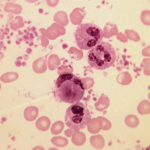Although 2020 was not a great year overall, it actually was a great year for lupus research.
Diet & RA

Dr. Fauci
One area of interest within rheumatoid arthritis (RA) related to diet, Dr. Silverman said. Monica Guma, MD, PhD, an associate professor of medicine in the rheumatology division at the University of California, San Diego, presented findings on a dietary intervention to improve RA and the microbiome in 20 patients (also see our story on p. 32 in this issue).
The diet focused on more omega-3 fatty acids, more fruits and vegetables, lower saturated fat, less gluten and the avoidance of dairy, among other factors. Researchers included patients who had at least three swollen and three tender joints. Most of the patients were female. The diet helped improve clinical outcomes overall and increased the abundance and diversity of microorganisms in the gut microbiome.
This type of research can help guide rheumatologists who are often asked about the effects of diet to help manage inflammation, Dr. Silverman said.
RA & New Guidelines

Dr. Azar
In other RA news, several presentations focused on other aspects of RA, such as the introduction of the ACR’s 2020 Guideline for the Management of Rheumatoid Arthritis. The guideline is updated from that released in 2015.1 “One of the things that was the most impactful was the increased patient shared decision making that was incorporated,” Dr. Kamen said.
The recommendations still focus on methotrexate as the anchor drug, but they add newer therapies, such as Janus kinase inhibitors.
Natalie E. Azar, MD, a clinical assistant professor at the Department of Medicine at New York University Grossman School of Medicine, moderated the closing session.
The ACR Convergence sessions will be available online through June 1.
Vanessa Caceres is a medical writer in Bradenton, Fla.
References
- Singh JA, et al. 2015 American College of Rheumatology Guideline for the Treatment of Rheumatoid Arthritis. Arthritis Care Res (Hoboken). 2016 Jan;68(1):1–25.



